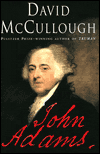|
|
|
Compared to his fellow revolutionaries and Presidents George Washington and Thomas Jefferson, John Adams was underexposed to the modern reader until David McCullough's publication of a new biography, John Adams. This 651-page tome richly rewards the reader with an understanding of Adams the patriot and the man, and an appreciation for his unique contributions to the birth of American independence. A Massachusetts lawyer and farmer, Adams became the principal advocate for independence in the Continental Congress in Philadelphia, which produced the Declaration of Independence in 1776 and then ran the Revolutionary War effort. Adams accepted several important and occasionally risky missions to Europe during and after the Revolutionary War. His forceful advocacy resulted in crucial loans to America from Dutch banks and a successful peace treaty with England. His writings on political theory influenced the structure of the new American government, including a bicameral legislature and an independent judiciary, as well as the Massachusetts state constitution, which he drafted. After serving as President Washington's Vice President, Adams was elected President in 1796. The crowning achievement of his term was to avert a war with France, which many viewed as inevitable and even desirable. He was then defeated for re-election by his old friend Jefferson. Adams's career included some low points, such as his futile push for undemocratic trappings of high office in the newly formed government and his signature to the Alien and Sedition Acts of 1798 (though they were not his idea), but his integrity was never in doubt. The man could not be bought. The author, a Pulitzer Prize-winning biographer of Harry Truman, stated that he started out to do a book on the relationship between Adams and Jefferson. He concluded that so much more ink had been spilled about Jefferson than about Adams that he should focus on Adams instead. Nevertheless he devotes considerable attention to the relationship between the two men, which evolved from warmest friendship to bitterest opposition to reconciliation by mail in old age, culminating in their deaths on the same day - July 4, 1826. McCullough's admiration for Adams's steadfastness shines forth from every page. McCullough makes Adams come alive not only in his public service but in his private life. The voluminous record of Adams's correspondence furnishes a trove of anecdotes. Adams was supremely happy in his long marriage to Abigail, whose letters reveal a woman of intelligence, fortitude and dedication. Without her unswerving support and strong management of his farm and family, Adams could not have been the exemplary public servant that he was. Adams was a devout Christian throughout his life, and religion helped him to weather his personal disappointments. Adams's life is a lesson in Yankee virtues: Be true to your friends, family and church. Live within your means. Get a good education and continue to read for the rest of your life. Show up when your presence is needed. Be straightforward and diligent. Stick to your principles even if it costs you. Making money isn't the highest good. Use your talents to uphold justice. Serve your country. John Adams is not a one-weekend read, but it is full of human interest as well as stirring historical narrative. It is an excellent choice for anyone interested in the brave men who made the great American experiment happen. As the author writes, "I don't think we can ever know enough about them." (Simon & Schuster, 2001; 651 pp., $35) |
 His conviction and persuasive powers in floor debates and committees made the difference at critical moments when delegates hesitated. While not charismatic or memorably eloquent, Adams supplied well-reasoned oral arguments that carried the day in meetings of fractious delegates.
His conviction and persuasive powers in floor debates and committees made the difference at critical moments when delegates hesitated. While not charismatic or memorably eloquent, Adams supplied well-reasoned oral arguments that carried the day in meetings of fractious delegates.

